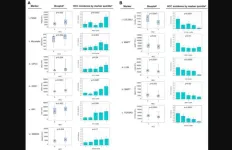(Press-News.org) New research by Joseph Reiner and colleagues at Virginia Commonwealth University shows promise for a urine-based test for ovarian cancer. Reiner will present their research at the 68th Biophysical Society Annual Meeting, to be held February 10 - 14, 2024 in Philadelphia, Pennsylvania.
Previous research showed that there are thousands of small molecules, called peptides, in the urine of people with ovarian cancer. While it is possible to detect those molecules using certain well-established techniques, those techniques aren't straightforward or cost effective. Reiner sought a new approach to more easily detect those peptides.
He turned to nanopore sensing, which has the potential to simultaneously detect multiple peptides. The basic idea of nanopore sensing involves passing molecules through a tiny pore, or nanopore, and measuring the changes in electrical current or other properties as the molecules move through.
To harness the nanopore technology to detect various peptides, Reiner used gold nanoparticles that can partially block the pore. Peptides, like those in the urine of people with ovarian cancer, will then “stick to the gold particle and basically dance around and show us a unique current signature,” Reiner explained.
The method is capable of simultaneously identifying multiple peptides, and in their study they identified and analyzed 13 peptides, including those derived from LRG-1, a biomarker found in the urine of ovarian cancer patients. Of those 13 peptides, Reiner said, “we now know what those signatures look like, and how they might be able to be used for this detection scheme. It's like a fingerprint that basically tells us what the peptide is.”
“Clinical data shows a 50-75% improvement in 5-year survival when cancers are detected at their earliest stages. This is true across numerous cancer types,” Reiner pointed out.
Their ultimate goal is to develop a test that, combined with other information like CA-125 blood tests, transvaginal ultrasound, and family history, could improve early-stage ovarian cancer detection accuracy in the future.
END
New method could detect early ovarian cancer from urine samples
2024-02-10
ELSE PRESS RELEASES FROM THIS DATE:
Scientists find new way to roll atomically thin nanosheets into scrolls
2024-02-10
Tokyo, Japan – Researchers from Tokyo Metropolitan University have come up with a new way of rolling atomically thin sheets of atoms into “nanoscrolls.” Their unique approach uses transition metal dichalcogenide sheets with a different composition on either side, realizing a tight roll that gives scrolls down to five nanometers in diameter at the center and micrometers in length. Control over nanostructure in these scrolls promises new developments in catalysis and photovoltaic devices.
Nanotechnology is giving us new tools to control the structure of materials at ...
New test for improving population-based colorectal cancer screening
2024-02-10
New test for improving population-based colorectal cancer screening
A new stool test appears to detect colorectal cancer precursors better than the current test. This could further reduce the number of new colorectal cancer cases as well as the number of people dying from the disease. A study led by the Netherlands Cancer Institute compared both tests. The results are published today in The Lancet Oncology.
Each year worldwide, approximately 1.9 million people are diagnosed with colorectal cancer, and 935,000 people ...
Quitting smoking at any age brings big health benefits, fast: study
2024-02-09
People who quit smoking see major gains in life expectancy after just a few years, according to a new study by University of Toronto researchers at Unity Health Toronto.
The study, published in NEJM Evidence, shows that smokers who quit smoking before age 40 can expect to live almost as long as those who never smoked. Those who quit at any age return close to never-smoker survival 10 years after quitting, and about half that benefit occurs within just three years.
“Quitting smoking is ridiculously effective in reducing ...
Discoveries can be used to optimize production of annatto powder
2024-02-09
Researchers at the University of São Paulo’s Luiz de Queiroz College of Agriculture (ESALQ-USP) and the Federal University of Viçosa (UFV) in Brazil have shown for the first time that bixin or annatto powder, a carotenoid pigment extracted from the seeds of the achiote or annatto tree (Bixa orellana), is not produced only in the seeds but also in other organs, and that the process intensifies in the plant’s adult phase.
An article on the study published in the Journal of Experimental Botany, also describes genetic modifications in the species that can optimize production of the pigment, which is widely used in the food ...
Harnessing human evolution to advance precision medicine
2024-02-09
Humans are still evolving, and Tatum Simonson, PhD, founder and co-director of the Center for Physiological Genomics of Low Oxygen at University of California School of Medicine, plans to use evolution to improve healthcare for all.
Her latest research, which was published February 9, 2024 in Science Advances, reveals that a gene variant in some Andean people is associated with reduced red blood cell count at high altitude, enabling them to safely live high in the mountains in low-oxygen conditions. Simonson’s UC San Diego lab is applying those findings toward understanding whether there may be a genetic component ...
For Black patients, 'representation matters' in evaluating prostate cancer websites
2024-02-09
Waltham — February 9, 2024 — For Black men with prostate cancer, racial representation is a key factor affecting trust in websites offering information on prostate cancer, reports a study in the March issue of The Journal of Urology®, an Official Journal of the American Urological Association (AUA). The journal is published in the Lippincott portfolio by Wolters Kluwer.
"Our study shows that representation matters to Black patients seeking prostate cancer information online," comments lead author Stacy Loeb, MD, MSc, PhD (Hon), of New York University Langone Health. "Not only does it impact trust in the information, but a lack ...
Having COVID-19 and Long COVID can impact women’s sex lives
2024-02-09
From work to school to socializing, COVID-19 has impacted just about every part of our lives—and now Boston University research has shown that also includes what happens in the bedroom. A study of more than 2,000 cisgender women found the coronavirus disease can impair sexual function, with long COVID having an especially detrimental effect.
“If you’re sick with COVID, you’re probably less interested in sex and maybe your body is less prepared to have sex,” says Amelia M. Stanton, a BU College of Arts & Sciences assistant ...
Mechanistically based blood proteomic markers in the TGF-β pathway stratify risk of HCC in patients with cirrhosis
2024-02-09
“A fundamental hypothesis we sought to test was whether biomarkers from the TGF-β signaling pathway might be of novel value in risk stratification of HCC in the clinical cirrhotic setting.”
BUFFALO, NY- February 9, 2024 – A new research paper was published in Genes & Cancer on February 5, 2023, entitled, “Mechanistically based blood proteomic markers in the TGF-β pathway stratify risk of hepatocellular cancer in patients with cirrhosis.”
Hepatocellular carcinoma (HCC) is the third leading cause of death from cancer worldwide but is often diagnosed at an advanced incurable stage. Yet, despite the urgent need for ...
Speed baiting: new report offers strategy for increasingly crowded Utah fishing
2024-02-09
There may, as they say, be plenty of fish in the sea — but angling opportunities on Utah’s streams, rivers and lakes are getting more crowded.
The number of anglers trying their luck on Utah waters has consistently increased over the years, meanwhile it’s getting more expensive for state managers to raise and stock gamefish and increasingly difficult to access water-based recreation during the ongoing megadrought.
Managers of fisheries in the state are being asked to do more with less these days, and they’re working more strategically to create sustainable opportunities for everyone picking up a rod and ...
Blocking artery supplying the brain covering after subdural hematoma reduced repeat surgery
2024-02-09
Research Highlights:
In the EMBOLISE clinical trial, obstructing (or blocking) an artery that supplies blood to the dura, the protective covering of the brain, along with surgery to remove pooled blood reduced the chances by nearly 3-fold that blood would reaccumulate and require additional surgery. According to researchers, complications related to the embolization procedure were low, and neurological function was comparable to those without embolization.
Chronic subdural hematoma, a pooling of blood between the brain and one of its outer coverings, is one ...






